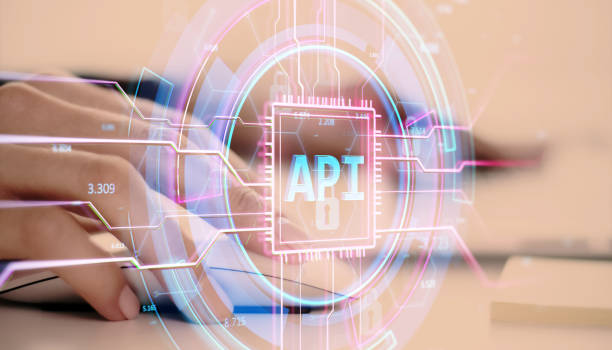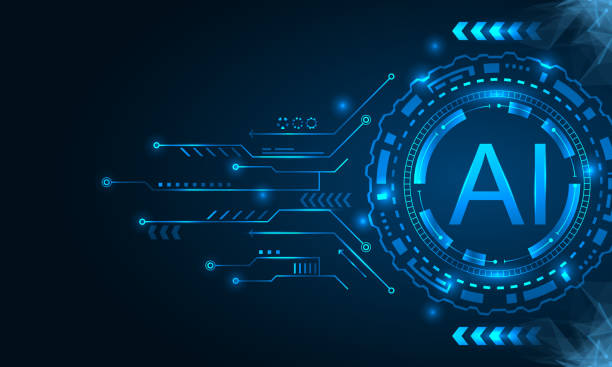What is Artificial Intelligence? Definition, History, and Key Concepts

Artificial intelligence or AI is a branch of computer science that deals with building machines that can perform tasks that typically require human intelligence.
These tasks include learning, reasoning, problem-solving, perception, and natural language understanding.
In fact, #artificial_intelligence tries to implement human mental abilities in the form of computer programs.
The history of artificial intelligence dates back to the 1950s, when scientists and mathematicians such as Alan Turing and John McCarthy laid the theoretical and practical foundations of this field.
McCarthy coined the term “artificial intelligence” in 1956 and organized a conference at Dartmouth College, which is recognized as the official starting point of this discipline.
Key concepts in artificial intelligence include Machine Learning, Deep Learning, Neural Networks, and Natural Language Processing.
Machine learning allows machines to learn from data without explicit programming.
Deep learning is a subset of machine learning that uses deep neural networks to analyze data.
Neural networks are models inspired by the structure of the human brain and consist of multiple layers of nodes (neurons).
Natural language processing allows machines to understand and generate human language.
Are you annoyed by losing customers who visit your site to buy?
Rasaweb is your specialized solution for having a successful online store.
✅ Significant increase in your online sales
✅ Creating trust and professional branding among customers⚡ Get free advice from Rasaweb experts!
Types of Artificial Intelligence from Expert Systems to Generative AI

Artificial intelligence can be divided into different types based on different capabilities and applications.
One of these classifications is based on the level of intelligence, which includes Narrow AI, General AI, and Super AI.
Narrow AI is designed to perform specific tasks and performs well in that limited area, such as facial recognition systems or movie recommenders.
Artificial General Intelligence (AGI) has the ability to do anything a human can do, but it has not yet been fully developed.
Artificial Super Intelligence (ASI) is beyond human intelligence and can outperform humans in all fields.
Another type of classification is based on function and application, which includes Expert Systems, Robotics, Computer Vision, and Generative AI.
Expert systems store specialized knowledge in a specific field and help users make decisions.
Robotics deals with the design and construction of robots that can perform dangerous or repetitive tasks.
Computer vision allows machines to understand and analyze images.
Generative AI can generate new content such as text, image and audio, such as ChatGPT.
Machine Learning vs. Deep Learning: Differences and Applications

Machine Learning and Deep Learning are two related but distinct concepts in the field of artificial intelligence.
Machine learning allows machines to learn from data and improve their performance without explicit programming.
This process involves the use of various algorithms that identify patterns and relationships by analyzing data.
Deep learning is a subset of machine learning that uses deep neural networks to analyze data.
Deep neural networks consist of multiple layers of nodes (neurons) that allow machines to identify more complex patterns in data.
The main difference between machine learning and deep learning is in how features are extracted from data.
In machine learning, engineers usually extract features manually, while in deep learning, neural networks automatically learn features from data.
The applications of machine learning and deep learning are very wide and include image recognition, natural language processing, sales forecasting, fraud detection, and many other things.
| Feature | Machine Learning | Deep Learning |
|---|---|---|
| Need for feature engineering | Yes | No |
| Algorithm type | Various algorithms | Deep neural networks |
| Complexity | Less | More |
| Required data volume | Less | More |
Applications of Artificial Intelligence in Various Industries

Artificial intelligence is widely used in various industries, including healthcare, manufacturing, finance, transportation, and retail.
In healthcare, artificial intelligence can help diagnose diseases, develop drugs, and provide personalized care.
For example, machine learning algorithms can analyze medical images to detect cancer at an early stage.
In the manufacturing industry, artificial intelligence can help improve efficiency, reduce costs, and increase product quality.
Robots equipped with artificial intelligence can perform repetitive and dangerous tasks, and predictive systems can predict equipment failures to prevent production downtime.
In the financial industry, artificial intelligence can help detect fraud, manage risk, and provide personalized financial services.
Machine learning algorithms can identify suspicious transactions, and advisory systems can help customers choose suitable investments.
In transportation, artificial intelligence can help improve safety, reduce traffic, and increase efficiency.
Self-driving cars use artificial intelligence for navigation and driving, and traffic management systems can optimize traffic flow.
In retail, artificial intelligence can help improve customer experience, increase sales, and reduce costs.
Recommender systems can suggest related products to customers, and chatbots can answer customer questions.
Are you dissatisfied with the low sales of your online store?
Rasaweb is your solution for having a professional and high-selling online store.
✅ Significant increase in sales and income
✅ Easy and enjoyable shopping experience for customers
⚡ Get free advice from Rasaweb right now!
Challenges and Limitations of Artificial Intelligence

Despite the remarkable progress in the field of artificial intelligence, there are still challenges and limitations that need to be addressed.
One of these challenges is the need for large amounts of high-quality data.
Machine learning algorithms need a large amount of data to train and improve their performance, and if the data is incomplete, inaccurate, or biased, the performance of artificial intelligence will also be affected.
Another challenge is Interpretability.
Many deep learning algorithms, especially deep neural networks, are black boxes, and it is not easy to understand how they arrived at a result.
This can be problematic in some applications, such as healthcare and law, because artificial intelligence decisions need to be explainable and justifiable.
In addition, ethical and social issues are among the important challenges in the field of artificial intelligence.
The use of artificial intelligence can lead to job losses, increased inequality, and violation of privacy.
The issue of security is also of great importance.
Artificial intelligence systems can be vulnerable to cyber attacks, and hackers can use them for malicious purposes.
Therefore, it is necessary to take appropriate security measures to protect artificial intelligence systems.
Finally, the development of artificial intelligence requires international cooperation and the development of common standards to ensure the responsible and ethical use of this technology.
Artificial Intelligence and the Future of Work

The development of artificial intelligence will have significant impacts on the future of work.
Some jobs will be lost due to automation and replacement by machines, while new jobs will be created that require new skills.
Jobs that require repetitive and routine tasks are more at risk of automation, such as telephone operators, office workers, and production line workers.
On the other hand, jobs that require creativity, critical thinking, communication skills, and emotional intelligence are less at risk and may even be strengthened by the development of artificial intelligence.
For example, artificial intelligence specialists, data scientists, robotics engineers, and business analysts will be in high demand.
Also, jobs that require direct interaction with humans, such as doctors, nurses, teachers, and social workers, will continue to maintain their importance.
To prepare for the future of work, it is necessary for people to learn new skills and adapt to технологический changes.
These skills include technical skills such as programming, data analysis, and machine learning, as well as soft skills such as critical thinking, problem-solving, creativity, and communication.
Continuous training and lifelong learning are also of great importance so that people can remain competitive in the labor market.
Natural Language Processing (NLP) and its Applications in Language Understanding and Generation

Natural Language Processing (NLP) is a branch of artificial intelligence that allows machines to understand and generate human language.
This field includes a wide range of tasks, including machine translation, speech recognition, text summarization, sentiment analysis, and question answering.
One of the main applications of NLP is machine translation, which allows machines to translate text from one language to another.
Modern machine translation systems, such as Google Translate, use deep learning algorithms to improve the accuracy and fluency of translations.
Speech recognition is also another important application of NLP, which allows machines to convert human speech into text.
This technology is used in voice assistants such as Siri and Alexa, as well as in speech-to-text software.
Text summarization allows machines to generate a summary of a long text.
This technology can be used to summarize news articles, research reports, and other text documents.
Sentiment analysis allows machines to detect the emotions and opinions present in the text.
This technology can be used to analyze customer opinions on social networks, review employee satisfaction, and evaluate the effectiveness of advertising.
Finally, question-answering systems allow machines to answer users’ questions in natural language.
This technology can be used in chatbots, virtual assistants, and customer support systems.
| Application | Description | Example |
|---|---|---|
| Machine translation | Translating text from one language to another | Google Translate |
| Speech recognition | Converting speech to text | Siri, Alexa |
| Text summarization | Generating a summary of a long text | Summarizing news articles |
| Sentiment analysis | Detecting emotions in the text | Analyzing customer opinions |
Robotics and Artificial Intelligence: Collaboration to Build Smart Machines

Robotics and artificial intelligence are two related fields that can work together to create smart and efficient machines.
Robotics deals with the design, construction, operation, and application of robots, while artificial intelligence deals with building machines that can perform tasks that typically require human intelligence.
By combining these two fields, robots can be built that are capable of performing complex tasks and making intelligent decisions.
Robots equipped with artificial intelligence can be used in various industries, including manufacturing, logistics, healthcare, and services.
In the manufacturing industry, robots can perform repetitive and dangerous tasks, and intelligent systems can optimize production lines.
In logistics, robots can move goods, and intelligent systems can optimize transportation routes.
In healthcare, robots can perform surgeries, and intelligent systems can help diagnose diseases.
In services, robots can help customers, and intelligent systems can answer their questions.
In addition, robots equipped with artificial intelligence can be used in dangerous and inaccessible environments for humans, such as mines, war zones, and space.
These robots can help explore resources, clean up contaminated areas, and carry out rescue missions.
With further advances in the fields of artificial intelligence and robotics, smart robots are expected to play a more important role in our daily lives.
Are you tired of losing customers due to the poor design of your online store? With Rasaweb, solve this problem forever!
✅ Increase sales and visitor-to-customer conversion rate
✅ Smooth and attractive user experience for your customers⚡ Get free advice
Ethics in Artificial Intelligence: Challenges and Solutions

With the increasing use of artificial intelligence, ethical issues related to this technology are also becoming more important.
One of these issues is discrimination.
Artificial intelligence algorithms can be unintentionally discriminatory if the data used to train them is biased.
For example, facial recognition systems may perform worse in recognizing the faces of people with dark skin tones if their training data includes more faces of white people.
Another issue is privacy.
Artificial intelligence systems can collect and analyze large amounts of personal data, which can lead to a violation of people’s privacy.
For example, surveillance systems equipped with artificial intelligence can track people’s behavior in public spaces, and recommendation systems can analyze people’s tastes and interests.
Accountability is also another important ethical issue in the field of artificial intelligence.
If an artificial intelligence system makes a mistake and harms someone, who will be responsible?
To address these ethical challenges, it is necessary to develop appropriate standards and regulations and for artificial intelligence developers and users to adhere to ethical principles.
Transparency, explainability, and accountability are among the important ethical principles in the field of artificial intelligence.
In addition, education and awareness raising to the general public is also of great importance so that people can be aware of the benefits and risks of artificial intelligence and make informed decisions about the use of this technology.
Smart artificial intelligence can facilitate daily tasks and complex decision-making.
The Future of Artificial Intelligence and Future Prospects
![]()
The future of artificial intelligence is very bright and full of potential.
With further advances in the fields of machine learning, deep learning, natural language processing, and robotics, artificial intelligence is expected to play a more important role in our daily lives.
In the future, we may see the development of Artificial General Intelligence (AGI) systems that are capable of doing anything a human can do.
These systems can help solve complex global problems such as climate change, poverty, and diseases.
Also, artificial intelligence is expected to create major transformations in various industries, including healthcare, manufacturing, finance, transportation, and education.
In healthcare, artificial intelligence can help diagnose diseases faster and more accurately, develop new drugs, and provide personalized care.
In manufacturing, artificial intelligence can help improve efficiency, reduce costs, and increase product quality.
In finance, artificial intelligence can help detect fraud, manage risk, and provide personalized financial services.
In transportation, artificial intelligence can help improve safety, reduce traffic, and increase efficiency.
In education, artificial intelligence can help provide personalized and adaptable education to the needs of each student.
However, the development of artificial intelligence also requires attention to ethical and social issues.
It is necessary to develop appropriate standards and regulations to ensure the responsible and ethical use of this technology and to prevent its potential risks. With the expansion of artificial intelligence in our lives, many changes will occur in our behavior and lifestyle.
By using this technology correctly, we can move towards a better and more sustainable future. I hope artificial intelligence, as a powerful tool, will help improve the quality of human life.
Frequently Asked Questions
| Question | Answer |
|---|---|
| What is the definition of Artificial Intelligence (AI)? | It is a field in computer science that aims to create intelligent machines that can think, learn, solve problems, and make decisions like humans. |
| Mention some common AI applications. | Includes self-driving cars, voice assistants (such as Siri and Alexa), recommendation systems (such as Netflix and Amazon), facial recognition, and medical diagnosis. |
| What is the difference between Narrow AI (ANI) and Artificial General Intelligence (AGI)? | Narrow AI is specialized in a single and specific task, while Artificial General Intelligence possesses human intellectual ability to perform any cognitive task. |
| What is Machine Learning and its relationship to AI? | Machine learning is a branch of artificial intelligence that focuses on developing algorithms that allow systems to learn from data without explicit programming. |
| What are Artificial Neural Networks? | They are computational models inspired by the structure and function of the human brain, and are used in deep learning to process data and discover complex patterns. |
| Mention some ethical challenges related to AI. | Includes privacy issues, bias in data and algorithms, job loss, and accountability in case of errors or unfair decisions. |
| What is Natural Language Processing (NLP)? | It is a branch of artificial intelligence that focuses on enabling computers to understand, interpret, and generate human language in a useful and interactive way. |
| How can AI affect the labor market? | It can lead to the automation of some routine tasks, requiring retraining of workers and creating new jobs in the fields of designing, developing, and maintaining AI systems. |
| What is Computer Vision? | It is a field in artificial intelligence that enables computers to “see,” understand, and interpret images and videos in the same way that humans do, enabling them to recognize objects and faces. |
| What is the importance of data in developing AI systems? | Data is the fuel that feeds AI systems, especially in machine learning. The quality and quantity of data greatly affect the accuracy and performance of models and their ability to learn and make correct decisions. |
And other services of Rasa Web advertising agency in the field of advertising
Intelligent data analysis: a professional solution for digital branding with a focus on intelligent data analysis.
Intelligent sales automation: Professional optimization to increase click-through rates using key page optimization.
Intelligent sales automation: A new service to increase digital branding by customizing the user experience.
Intelligent SEO: An effective tool to interact with users by designing an attractive user interface.
Intelligent customer journey map: A fast and efficient solution to increase sales with a focus on dedicated programming.
And more than hundreds of other services in the field of internet advertising, advertising consulting, and organizational solutions
Internet advertising | Advertising strategy | Reportage ad
Sources
Basic principles of artificial intelligence in Persian
,What is artificial intelligence?
,How to use artificial intelligence in everyday life
,Artificial intelligence
? In the fast-paced world of digital, Rasaweb Digital Marketing Agency, with its expertise and experience, is the key to the success of your business. From personal website design to comprehensive digital campaigns, we are with you to have a powerful and effective presence in the online space.
📍 Tehran, Mirdamad Street, next to the Central Bank, South Kazerun Alley, Ramin Alley No. 6



